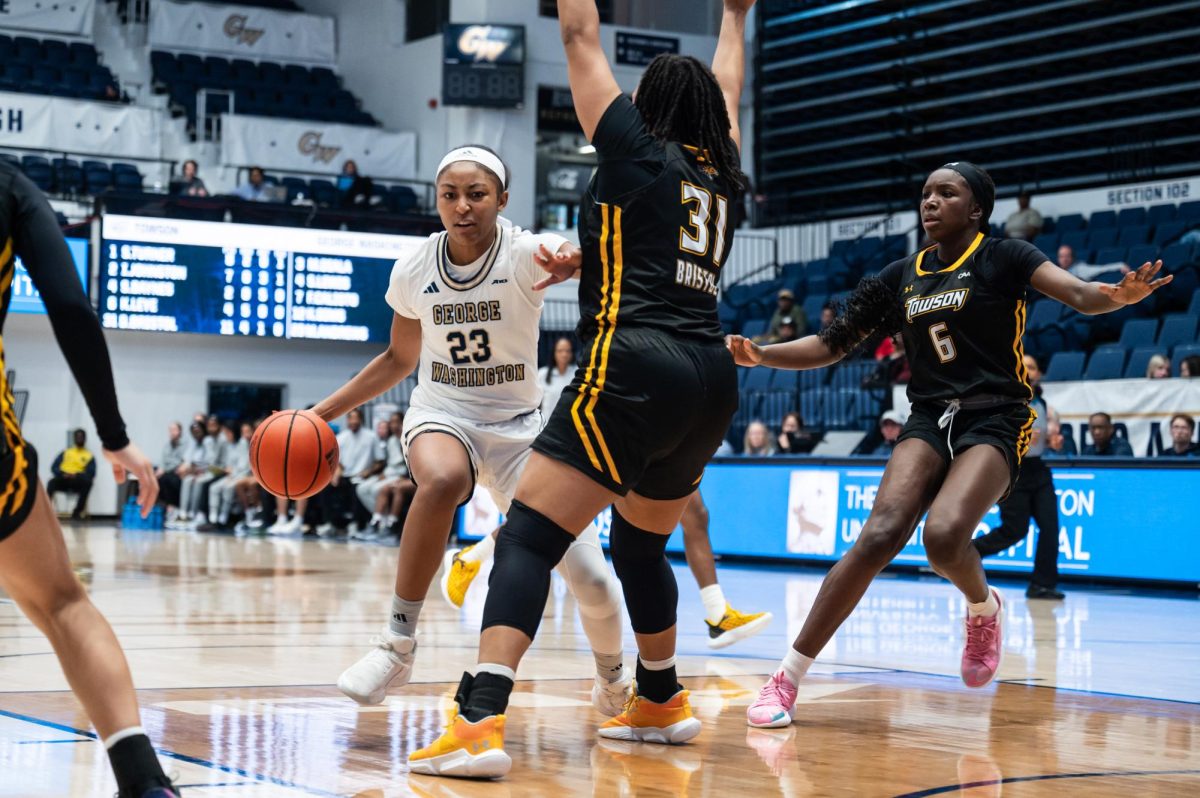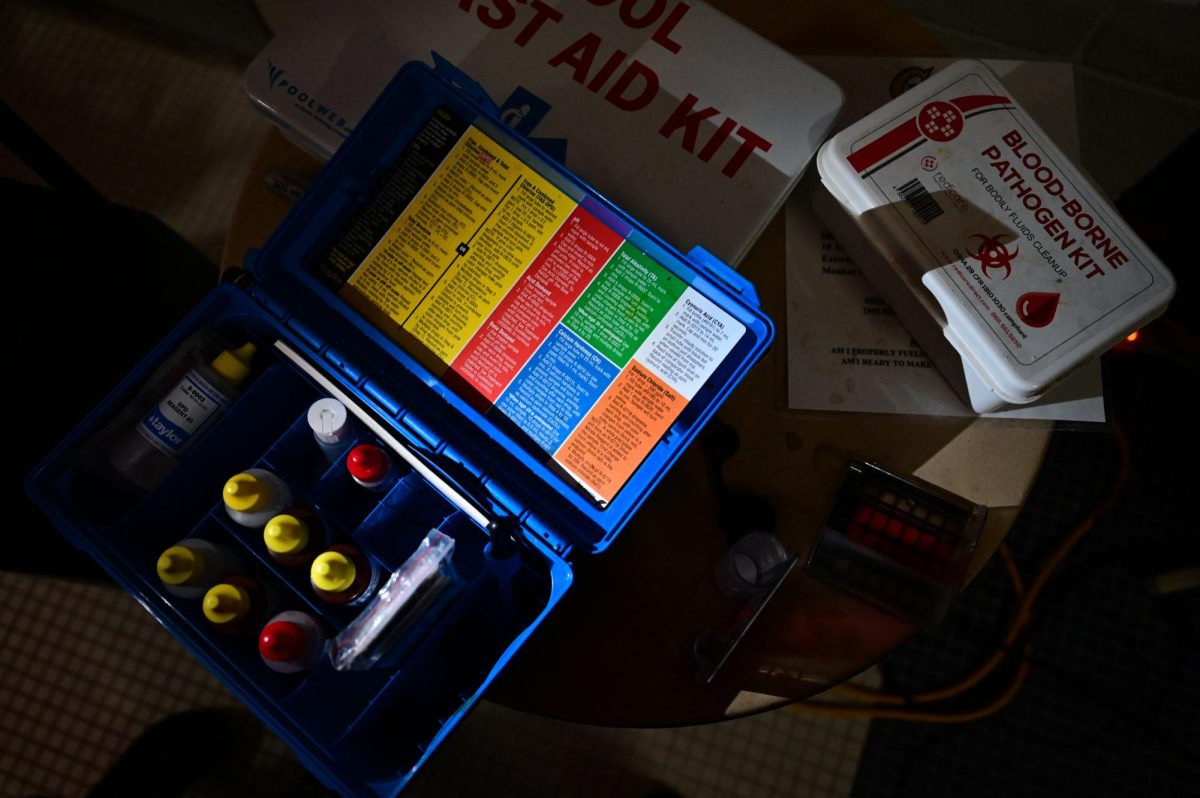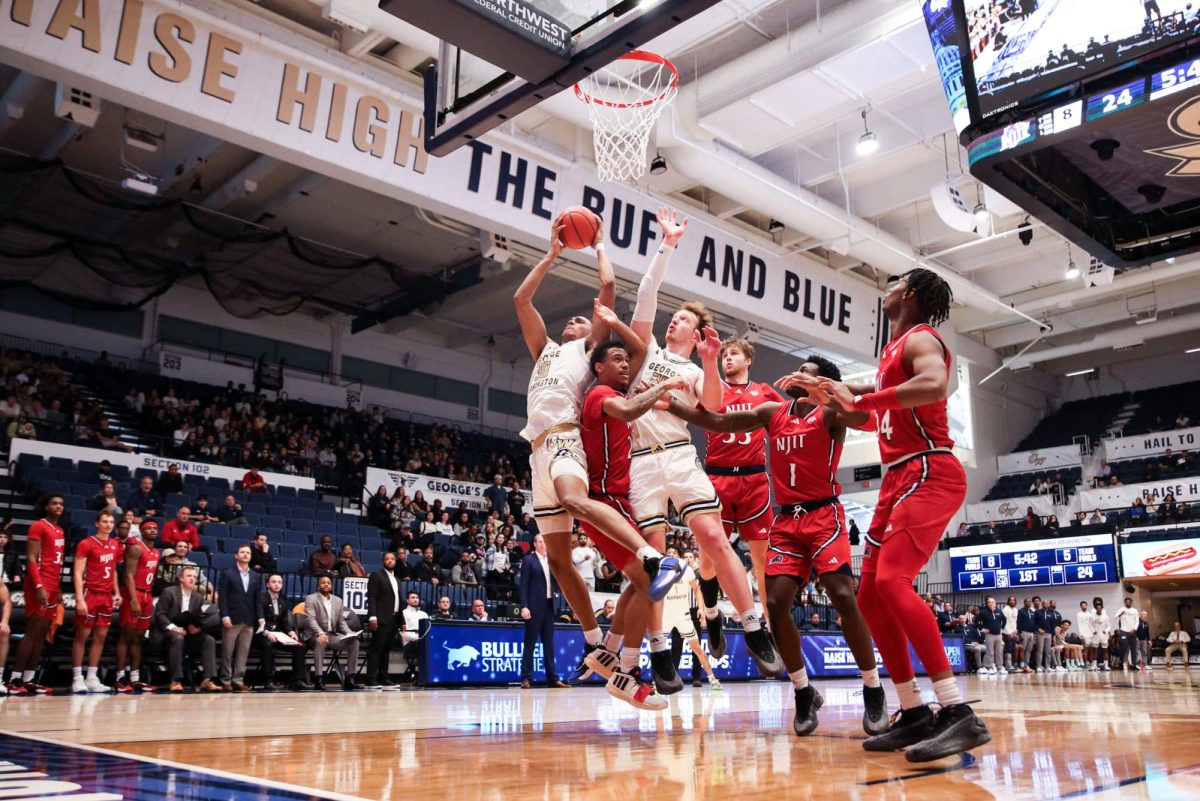When GW recruited graduate student forward Tara Booker in 2008, she remembers watching in awe as her future team soared to impressive heights.
After tallying a 12-2 Atlantic 10 record, the 2007-08 Colonials earned a trip to the NCAA tournament. Once there, they made quick work of Auburn, then Cal, and ultimately ended their season as a member of the coveted Sweet Sixteen.
“I remember watching and thinking, ‘This is what I want,’ ” Booker said.
GW has not reached the Big Dance or even the A-10 semifinals since that season. But rookie head coach Jonathan Tsipis made strides this year in returning the once-prolific program to its former glory.
For the first time since 2009, the Colonials posted a winning record. And for the first time since 2008, they grabbed a victory in the A-10 tournament. The win was a special moment for the graduate student players especially, who had never experienced such heights since reaching Foggy Bottom.
“I was very specific with one goal, and that was, could we get better on a daily basis, as the season progressed,” Tsipis said. “If we weren’t becoming better, we were going in the other direction.”
Implementing a new strategy that called for a defensive-minded squad instead of the previously offense-focused one, Tsipis changed the culture of GW basketball to fit his own personality to cultivate what he called a “championship culture.”
Despite a steep learning curve due to the new game plan and intense off-the-court conditioning push, the Colonials responded to their new coach’s call. Not only did they consistently improve throughout the season. They never stopped battling in the face of growing pains.
Despite some tough stretches, GW ultimately accumulated nearly double last year’s conference win total.
“I feel like throughout the years I’d been here it was kind of like a let down after let down,” Booker said. “This year just shows how far coach Tsipis has taken the team and is going to take us in the future.”
Along with an overhaul of GW’s on-the-court makeup, Tsipis brought his team closer as a family. It was a team that showed itself to be a close-knit community early, when members of the Colonials climbed aboard a bus in July to console their head coach at his mother’s funeral service.
Throughout the season, Tsipis led through open communication, which, in turn, allowed his players to better understand their respective roles on the team. Senior forward Megan Nipe, one of GW’s clutch role players this year, said it also encouraged the formation of stronger connections between upperclassmen and younger players.
Nipe, who averaged six points per game last year, became the poster child for Tsipis’s new strategy. By the end of what turned out to be her best effort yet, she finished with a markedly improved average of 10 points per game, just 0.1 behind first-place senior Danni Jackson on the team’s leaderboard.
“The old system, I guess I had a harder time understanding it,” Nipe said. “With this new system, I thought it would be a challenge to pick up, but it really clicked for me. And when it clicked for me, I was able to help it click for other people as well.”
Booker said she couldn’t think of a single Colonial who didn’t buy into Tsipis’ strategy. One of the most prominent examples of a team member accepting Tsipis’s new look was graduate student center Sara Mostafa. Mostafa, who has been a dominant paint presence in much of her five-year career with GW, played many of her minutes this year off the bench.
Unselfish play was a paramount piece of the puzzle for the Colonials this year. For veterans like Mostafa and Booker, though, making sacrifices was just a small price to pay for winning an A-10 tournament game in Philadelphia.
“The way coach Tsipis plays is with team basketball,” Booker said. “I was extremely happy he was able to coach me in my last year of college. I wish it came a little earlier.”
But when asked how he would assess his own individual performance this season, Tsipis refrained from giving a definite answer.
After all, upon agreeing to head the GW squad last April, he never viewed his coaching role as having a definite endpoint.
“I would say ‘incomplete’ because despite all of the things that we have accomplished, we are still building more,” Tsipis said. “We talked about doing it the right way here, doing it for the long haul. To say I get a grade at the end of one season isn’t what I’m looking for.”
But consistent progress is something he is looking for. And as he looks at a roster that could return three of its seniors from this season, Tsipis is confident his program will enjoy another season of firsts – perhaps even an A-10 quarterfinal win.
Though he likes where GW is at right now, he craves the future even more.
“I think when people talk about GW women’s basketball right now, they know that great things are in store and progress is being made,” Tsipis said. “And we like that challenge of being able to continue that progress.”






